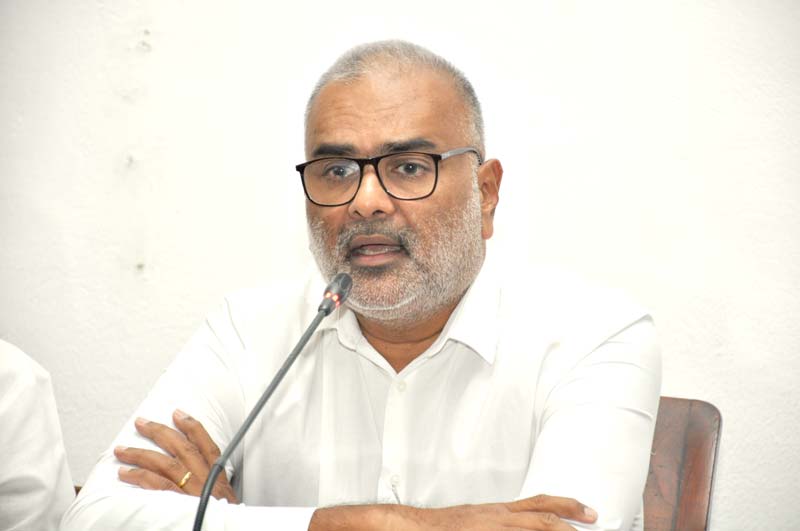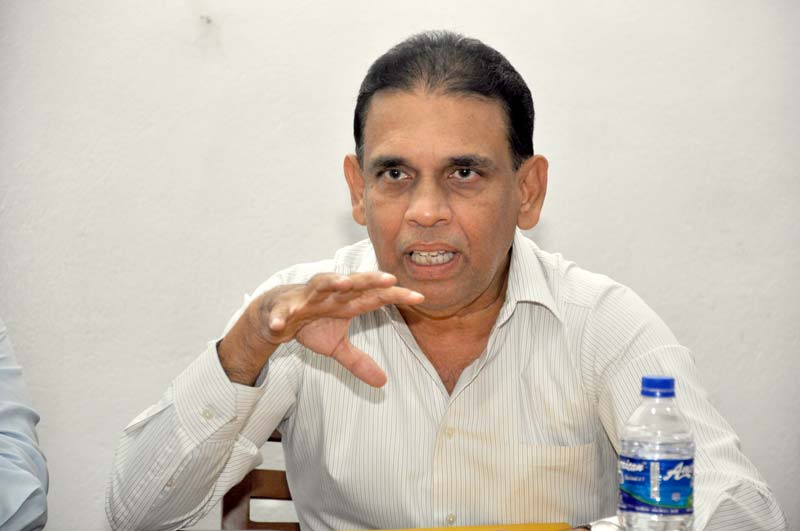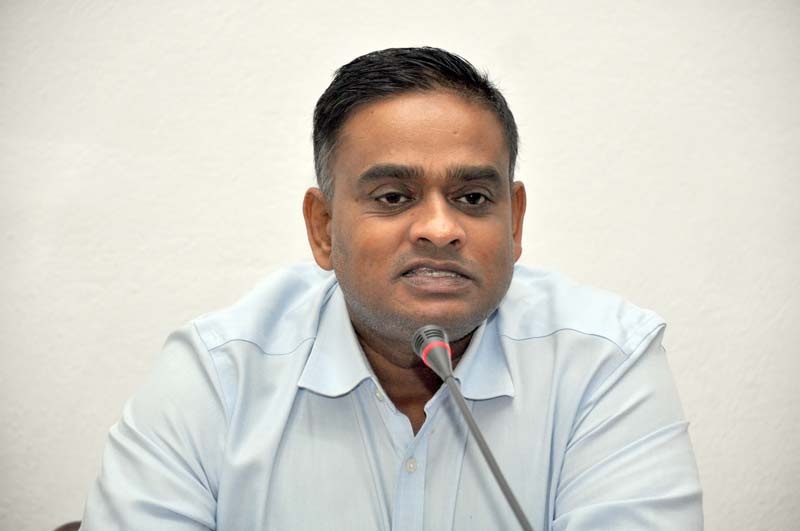Sunday Feb 15, 2026
Sunday Feb 15, 2026
Thursday, 5 October 2023 02:23 - - {{hitsCtrl.values.hits}}

SLAITO President Nishad Wijetunga

SLAITO Vice President Nalin Jayasundera

SLAPCEO President Imran Hassan
By Charumini de Silva
Leading tourism associations have raised concerns about the potential adverse effects of Government-mandated minimum room rates (MRR) on the sustainability of the industry.
In a joint press conference held with the Sri Lanka Inbound Tour Operators Association (SLAITO), Sri Lanka Association of Professional Conference, Exhibition and Event Organisers (SLAPCEO) and Association of Small and Medium Enterprises in Tourism Sri Lanka (ASMET) industry representatives emphasised on potential drawbacks of fixed prices, imposed to cater to a select group of hoteliers, could have detrimental consequences for the sector.
SLAITO President Nishad Wijetunga underscored the industry’s concerns, pointing out that since the introduction of MRR for Colombo city hotels, there has been a noticeable negative impact on tourist arrivals, making it challenging for authorities to meet their monthly targets.
“We reiterate the adverse impact on behalf of the entire industry. Our stand is that the market forces should determine prices and not an MRR and this is definitely not the right time to implement an MRR as it will affect all new businesses,” he added.
As per the Gazette notification, the prices for corporate and free independent tourists (FIT), the MRR structure has been defined to accommodate different hotel categories: $ 100 for 5-star hotels, $ 75 for 4-star establishments, $ 50 for 3-star accommodations, $ 35 for 2-star hotels and $ 20 for one-star tourist hotels with effect from 1 October.
He said that both tour operators and the customers have voiced concerns over the MRR hinting that business may be diverted to more competitively priced destinations.
“Sri Lanka’s tourism industry has been hit for three consecutive years since 2019. We do not have time for trial and error now. That is why we insist that we are not ready to risk tourism hit again with the MRR after all we have been through. Once the damage is done, it will be too late and too expensive for any adaptation,” Wijetunga stressed.
Emphasising that both tour operators and customers have expressed reservations about the MRR, indicating a potential shift towards more competitively priced destinations.
“The MRR is leading to Sri Lanka being perceived as an expensive destination and negatively impacting its competitiveness. Since the announcement was made in June, it sent out a negative signal to the market,” he claimed.
Wijetunga urged authorities to adopt innovative approaches rather than resorting to fixed pricing strategies. He emphasised the need for active marketing efforts, particularly in Colombo, through regular events to draw visitors and boost revenue within city hotels.
“Over the past four years, the tourism industry has faced significant challenges, but none of those were controllable. Unfortunately, this situation, which can be controlled, is being driven by industry stakeholders solely for their own satisfaction,” he lamented.
SLAITO Vice President Nalin Jayasundera argued that the reintroduction of MRR was leading Sri Lanka to price itself out of the market.
“A comparative study indicates that Colombo’s room rates under the MRR stand higher than other regional players like Bangkok, Kuala Lumpur, Hanoi, Dubai and Delhi. Implementing MRR risks Sri Lanka as a less price-competitive destination,” he said
He pointed out that artificially fixing prices does not lead to elevating Sri Lanka as a high-end destination. “True demand arises from a rich array of activities and events with higher levels of standardisation. Schemes like MRR are good for a lazy group of people,” he added.
Jayasundera argued that if the hotels outside Colombo have not obtained loans to cover their costs and if authorities are ready to introduce MRR on a blanket basis.
Pointing out that India is the single biggest tourist traffic generating market with over 200,000 arrivals year-to-date, he said it will be impacted as they are price sensitive. In addition, he feared that the Chinese arrivals would be affected.
“Making the tourists pay for the financial burden of hoteliers on top of expensive air ticket prices is unfair and will only make the destination uncompetitive and bring down the only opportunity to boost businesses,” he claimed.
SLAPCEO President Imran Hassan highlighted the adverse impact of MRR on the Indian Meetings, Incentives, Conferences and Exhibitions (MICE) business, a significant contributor to Colombo’s tourism traffic.
He explained the difficulties faced in attracting new MICE and wedding tourism businesses under the current pricing structure.
“Sri Lanka is not operating in isolation but faces competition from popular destinations. The Indian Travel Agents Association (TAAI) President has openly remarked on the detrimental effects of the MRR on Sri Lanka’s tourism industry,” he added.
ASMET President Rohan Abeywickrema pointed out that the commission hotels have to pay to Online Travel Agencies (OTAs) exceeds that of selling through travel agents, potentially leading hotels to withdraw from OTAs.
“This will lead to hotels pulling out of those platforms and losing more businesses,” he added.
He identified the FIT segment as the most likely to be affected.
They also said when MRR was imposed in 2009, they were effective for only two years, and afterwards, hotels undercut the rates, which will happen eventually this time too.
Pix by Lasantha Kumara